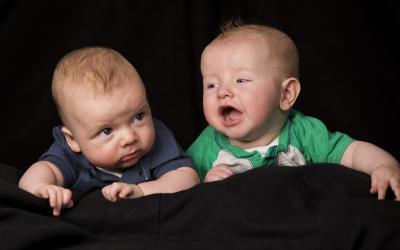Adults may not understand what an infant is feeling but it's child's play to another baby.
A paper in Infancy contends that infants can recognize each other's emotions by five months of age.
"Newborns can't verbalize to their mom or dad that they are hungry or tired, so the first way they communicate is through affect or emotion," says psychology professor Ross Flom of
Brigham Young University
. "Thus it is not surprising that in early development, infants learn to discriminate changes in affect."
The author has also written that infants' can understand the moods of dogs, monkeys and classical music.
Infants can match emotion in adults at seven months and familiar adults at six months. In order to test infant's perception of their peer's emotions, Flom and his team of researchers tested a baby's ability to match emotional infant vocalizations with a paired infant facial expression.
"We found that 5 month old infants can match their peer's positive and negative vocalizations with the appropriate facial expression," says Flom. "This is the first study to show a matching ability with an infant this young. They are exposed to affect in a peer's voice and face which is likely more familiar to them because it's how they themselves convey or communicate positive and negative emotions."

Babies can understand each others emotional signals at five months of age, says a new paper. These baby boys are cousins -- the one on the left is four months old and the one on the right is five months. Credit: Jaren Wilkey/BYU
In the study, infants were seated in front of two monitors. One of the monitors displayed video of a happy, smiling baby while the other monitor displayed video of a second sad, frowning baby. When audio was played of a third happy baby, the infant participating in the study looked longer to the video of the baby with positive facial expressions. The infant also was able to match negative vocalizations with video of the sad frowning baby. The audio recordings were from a third baby and not in sync with the lip movements of the babies in either video.
"These findings add to our understanding of early infant development by reiterating the fact that babies are highly sensitive to and comprehend some level of emotion," says Flom. "Babies learn more in their first 2 1/2 years of life than they do the rest of their lifespan, making it critical to examine how and what young infants learn and how this helps them learn other things."
Flom co-authored the study of 40 infants from Utah and Florida with Professor Lorraine Bahrick from Florida International University and says the next step in studying infant perception is to run the experiments with a twist: test whether babies could do this at even younger ages if instead they were watching and hearing clips of themselves.